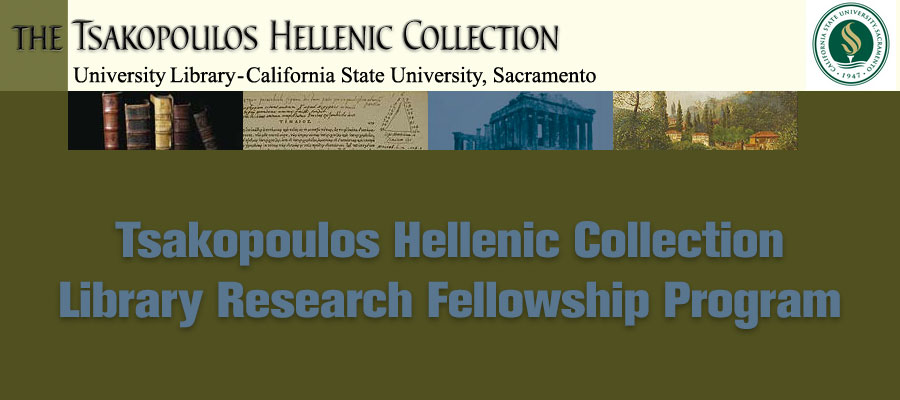Thanks to generous ongoing funding from the Elios Charitable Foundation and additional funding from the Tsakopoulos Hellenic Foundation, the University Library at California State University, Sacramento is pleased to announce the continuation of the Library Research Fellowship Program to support the use of the Tsakopoulos Hellenic Collection by fellows for scholarly research in Hellenic studies while in residence in Sacramento, CA. The Program provides a limited number of fellowships ranging from $1,000 to $4,000 to help offset transportation and living expenses incurred during the tenure of the awards and is open to external researchers anywhere in the world at the doctoral through senior scholar levels (including independent scholars) working in fields encompassed by the Collection’s strengths who reside outside a 75-mile radius of Sacramento. Only researchers on unpaid leave or with partial funding from their home institution and/or other sources are eligible for fellowship funding under this Program.
The term of fellowships can vary between two weeks and three months, depending on the nature of the research, and for the current cycle will be tenable from September 1, 2019-August 31, 2020. On-campus housing and dining options are available during summer months at a considerable savings over off-campus alternatives through the Sacramento State Housing and Residential Life Conference Housing Services.
Consisting of the holdings of the former Speros Basil Vryonis Center for the Study of Hellenism, the Tsakopoulos Hellenic Collection is the premier Hellenic collection in the western United States and one of the largest of its kind in the country, currently numbering approximately 75,000 volumes. It comprises a large circulating book collection, journal holdings, electronic resources, non-print media materials, rare books, archival materials, art and artifacts. With its focus on the Hellenic world, the Collection contains early through contemporary materials across the social sciences and humanities relating to Greece, the Balkans, the Ottoman Empire and modern Turkey, and the surrounding region, with particular strengths in Byzantine, post-Byzantine, and Modern Greek studies, including the Greek diaspora worldwide. There is a broad representation of over 20 languages in the Collection, with a rich assortment of primary source materials. Since 2009 the collection has experienced particularly dramatic growth through several major gift acquisitions.
